Hi Keith...why would an audio engineer use his ears when designing equipment?
(1) Because he doesn't trust the gear. Frankly the gear used to be pretty limited and not trusting it thoroughly was a pretty good idea.
(2) Because he doesn't trust his ability to exploit the gear, given that it is now generally pretty trustworthy.
Does a car manufacturer not test drive?
The counterpoint is that many of the top auto executives don't drive. They have company-provided chauffeurs. Would you trust a test drive by someone who drives only rarely or not at all? In Detoit there is a distinction between "Car Guys", "Businessmen", and "Technicans". The average auto engineer is not a very good test driver, and can't even change oil or spark plugs.
The same is true about audio engineers.
Does a wind tunnel specialist not actually do live tests rather than just from the engineering specs?
Wind tunnel testing is no less abstract than power amp bench tests.
Live test brings in 'real life' vagaries and unmeasureables in many sciences. Medicine included as it is a science around human anatomy...which audio engineering is as well.
Well let's talk about people who do medical research since I have two kids in that biz. A lot of them are chemists and engineers, not MDs. For example a lot of cancer researchers haven't talked to a human cancer patient since before they got their PhD. If you are a medical pathologist it can help you get through the day if you see your work pieces as isolated pieces of tissue, not parts of real breathing people.
Thus, i don't get the sense being an engineer of audio means you don't use your ears to evaluate equipment.
It is common knowledge in the audio biz that subjective testing done right is time consuming and expensive. Much more so if the thing you are engineering involves subtle effects. So some degree building audio gear is like making fine furniture. There is a lot of measuring and cutting, and not much visual appreciation of the finished piece.
David Wilson, Andy Payor, Dan D'Agostino, Flemming Rasmussen, Ken Ishiwata of Marantz, Lew Johnson...all well known veterans of the industry...all use measurements, all also listen to their equipment, sometimes have reference recordings they use when listening to their equipment (which in some cases they recorded live themselves).
The sad truth is that everybody's hearing goes down hill as they age. Do you send the old horse out to pasture just because he measures before he cuts?







